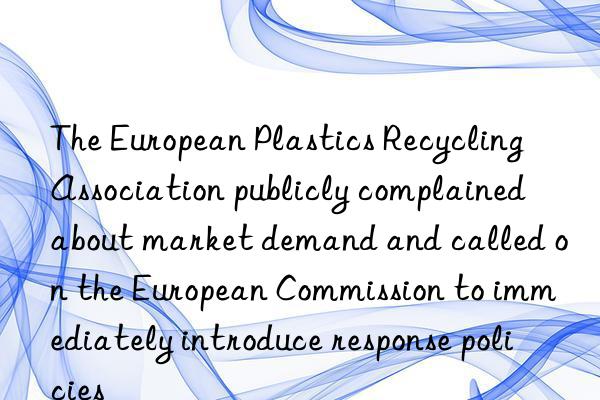
Recently, a number of organizations, including Plastics Recycling Europe (PRE) and the European Recycling Industry Alliance (EuRIC), simultaneously issued open letters requesting the European Commission to take practical measures to address market demand issues.
"The European plastics recycling market will be severely disrupted throughout 2023. Since the beginning of this year, the price of recycled plastics has dropped by up to 50%. At the same time, imports of cheap products from outside the EU have increased significantly. If immediate measures are not taken to reduce the pressure on European recyclers, Europe Legal targets will not be met, as well as the latest proposed recycled and recycled content targets.”
Public account comment: Legal here binding) target mainly refers to the SuPD (Primary Plastics Directive) 2025 beverage bottle recycled content target of 25% and related collection rate targets. The latest proposed goals are among the goals in the PPWR, but the implementation content has not yet been finalized by the PPWR. From the perspective of rPET, China's particle exports are relatively small, because it has been relatively short for companies to obtain EFSA certification, and Europe's price competitiveness has been weak recently. Therefore, it is speculated that in the statistics below, the rPET particles imported by Europe mainly come from Southeast Asia, India and Turkey etc.
PRE Chairman Ton Emans stated, “The future of the recycling industry is at a critical juncture and enforcement measures are needed. "Immediate action will be taken in the form of measures to avoid the closure of European recycling plants. Stopping recycling activities will have a direct (knock-on) impact on European jobs, the overall economy and the environment."
"All recycled polymers are facing market weakness, but the PET recycling industry is the most representative. Due to the lack of an equal market, EU PET imports rose by 20% from the second quarter of 2022 to the second quarter of 2023, resulting in a decline in EU-produced rPET Demand fell. Unsustainable market momentum (according to PRE research) led to a 10% decline in rPET over the same period.”
“Despite the targets set by the Primary Plastics Directive and the increasing pressure to increase the recycled content of beverage bottles, however, this is not meeting demand through the supply of rPET produced in Europe, but has led to an increase in imports from opaque non-European countries.”
“Regulation has proven to be the most effective tool in setting the future path for a circular economy for plastics. However, enforcement measures are necessary for its effective implementation. Without it, Europe risks untraceable, unverifiable plastics participating in European recycling targets. The introduction of an independent, third-party certification system can solve these problems. At the same time, this can help avoid unverified claims, promote traceability, especially for food contact materials, and promote transparency in the traceability of recycled plastics.”
Similar to PRE, EuRIC also called for immediate measures to support the European plastic recycling industry. The proposed measures not only include the establishment of a traceability system, but also include the following three points: • Implementing realistic and mandatory EU recycled content targets to drive demand for recycled materials, which can also provide investment security for expanding recycling capacity; introducing incentives, whether in the form of market or taxation, to address the price gap between virgin and recycled, e.g. , setting lower VAT rates for recycled plastic products; mandatory collection rates and mandatory design-for-recycling guidelines to improve the quantity and quality of raw materials for production.

 微信扫一扫打赏
微信扫一扫打赏

